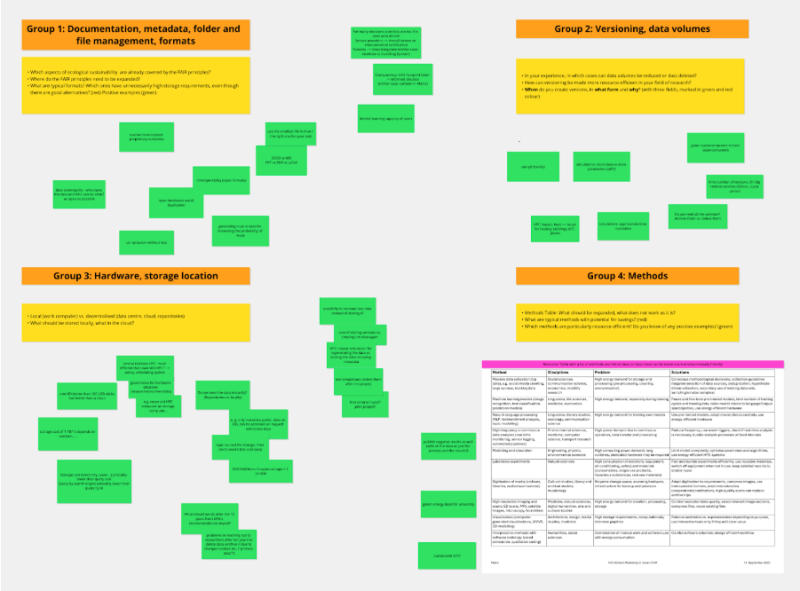Report from a consortium meeting workshop on an important topic
The workshop was conducted as a round-table discussion with eight participants and two moderators coming from the infra-dmp subworkgroup ‘DMPs for Environmentally Friendly RDM’, who are currently working on a guide to environmentally sustainable research data management.
It started with a general introduction of the subject, covering the environmental impact of research data, the recommendation from the working group GreeningDH within the association “Digital Humanities in deutschsprachigem Raum” (https://dhd-greening.github.io/), and their first implementation as a DMP template (https://doi.org/10.5281/zenodo.15390060).
Four thematic areas for the group discussion
- Topic 1: Documentation, metadata, folder and file management, formats;
- topic 2: Versioning, data volumes;
- topic 3: Hardware, storage location;
- topic 4: Methods.
Although there is some overlap between the various topics, this division enabled a structured discussion. There was a lively feedback especially on some discussion points, which led to many useful suggestions and raised new questions for consideration:
- The limited decision power of scientists, as well as their limited capacity for getting used to many new solutions, which might not be directly part of their research.
- The necessity of transparent information communication, such as a “CO2 footprint label”, to allow for informed decision making.
- The suggestion to choose less powerful formats for everyday operations (e.g. Markdown for simple text notes).
- The still open question about the destiny of stored data beyond the mandatory duration (10 years).
- The higher efficiency degree achievable through a centrally managed infrastructure.
- The different cost items for data storage and queries, also dependent on the expected availability (online on a cloud = in real time vs offline on a tape = on request).
- In case of simulation data, the different cost of storing data vs recreating them after having saved the parameters (all!).
- The possibility of reusing waste heat to heat buildings, etc.
The results of the discussion will be incorporated into the current work on the guide to environmentally sustainable research data management. Two further workshops will follow within different communities, which should help to ensure that as many disciplines and perspectives as possible are taken into account. The first version of the guide will be opened for peer review at the end of 2025.
